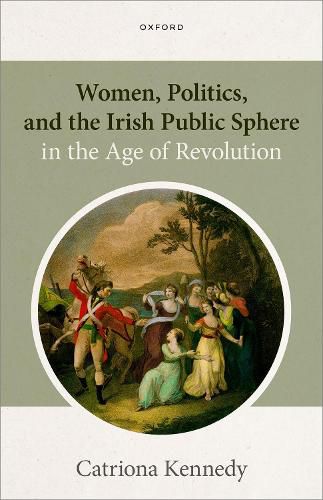Readings Newsletter
Become a Readings Member to make your shopping experience even easier.
Sign in or sign up for free!
You’re not far away from qualifying for FREE standard shipping within Australia
You’ve qualified for FREE standard shipping within Australia
The cart is loading…






The late-eighteenth-century 'age of revolutions' has long been identified as a key moment in the gendering of modern democratic politics, one which opened up new debates on the 'rights of women' while often re-affirming the masculinity of the political citizen. In Ireland, the revolutionary era saw the rise of the radical United Irish movement, mass popular mobilisation, and reached a violent denouement in the 1798 rebellion. But what did Ireland's age of revolution mean for women? Was radical republicanism able to imagine women as political actors? How did Irish women experience and navigate the intense ideological conflicts of the 1790s? Addressing these and related questions, this is the first book-length study of women and Irish politics in the late eighteenth century. Revising a stubborn tendency to present women's political engagements in this period as largely mediated through men, it stresses instead women's concerns, initiatives, and networks. It reconstructs the distinctively gendered political cultures of Ireland's principal communitiesDSthe dynastic politics of the Protestant elite; the dynamic oppositional culture of Belfast Presbyterianism; the urban and agrarian radicalism of unpropertied CatholicsDSand asks how these shaped the meanings of the 1790s for women. In looking beyond the homosocial spaces of the club, pub, lodge, and corps, it reveals a complexly gendered public sphere in which women were often active participants. As the subjects of United Irish addresses, religious sermons, state surveillance, and post-rebellion commemoration, women emerge as a clear, if overlooked, constituency in Ireland's age of revolution. And it suggests how our understanding of revolution might change when viewed from the perspective of women.
$9.00 standard shipping within Australia
FREE standard shipping within Australia for orders over $100.00
Express & International shipping calculated at checkout
The late-eighteenth-century 'age of revolutions' has long been identified as a key moment in the gendering of modern democratic politics, one which opened up new debates on the 'rights of women' while often re-affirming the masculinity of the political citizen. In Ireland, the revolutionary era saw the rise of the radical United Irish movement, mass popular mobilisation, and reached a violent denouement in the 1798 rebellion. But what did Ireland's age of revolution mean for women? Was radical republicanism able to imagine women as political actors? How did Irish women experience and navigate the intense ideological conflicts of the 1790s? Addressing these and related questions, this is the first book-length study of women and Irish politics in the late eighteenth century. Revising a stubborn tendency to present women's political engagements in this period as largely mediated through men, it stresses instead women's concerns, initiatives, and networks. It reconstructs the distinctively gendered political cultures of Ireland's principal communitiesDSthe dynastic politics of the Protestant elite; the dynamic oppositional culture of Belfast Presbyterianism; the urban and agrarian radicalism of unpropertied CatholicsDSand asks how these shaped the meanings of the 1790s for women. In looking beyond the homosocial spaces of the club, pub, lodge, and corps, it reveals a complexly gendered public sphere in which women were often active participants. As the subjects of United Irish addresses, religious sermons, state surveillance, and post-rebellion commemoration, women emerge as a clear, if overlooked, constituency in Ireland's age of revolution. And it suggests how our understanding of revolution might change when viewed from the perspective of women.